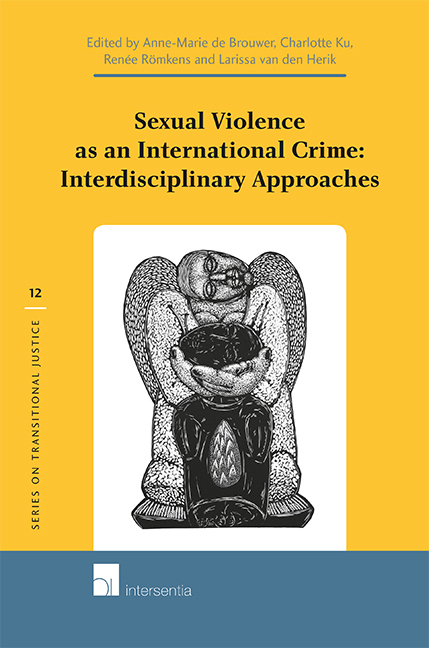Book contents
- Frontmatter
- Acknowledgements
- Foreword
- Contents
- Abbreviations
- INTRODUCTION
- PART 1 OVERVIEW OF SEVERAL MILESTONES AND CHALLENGES CONCERNING INTERNATIONAL CRIMINAL PROSECUTION OF SEXUAL VIOLENCE
- A HISTORICAL PERSPECTIVE, THE WAY FORWARD AND MILESTONES LONG OVERLOOKED
- THE INTERNATIONAL TRIBUNALS AND COURTS
- PART 2 SOCIAL, ARCHIVAL AND MEDICAL DATA COLLECTION AND ITS USE FOR THE CRIMINAL LAW PROCESS: METHODOLOGY ISSUES
- PART 3 SURVIVING SEXUAL VIOLENCE, STORY TELLING AND CREATING AWARENESS
- CONCLUDING REMARKS
- About the Contributors
Chapter 3 - Prosecuting Gender-Based Persecution as an International Crime
Published online by Cambridge University Press: 16 December 2020
- Frontmatter
- Acknowledgements
- Foreword
- Contents
- Abbreviations
- INTRODUCTION
- PART 1 OVERVIEW OF SEVERAL MILESTONES AND CHALLENGES CONCERNING INTERNATIONAL CRIMINAL PROSECUTION OF SEXUAL VIOLENCE
- A HISTORICAL PERSPECTIVE, THE WAY FORWARD AND MILESTONES LONG OVERLOOKED
- THE INTERNATIONAL TRIBUNALS AND COURTS
- PART 2 SOCIAL, ARCHIVAL AND MEDICAL DATA COLLECTION AND ITS USE FOR THE CRIMINAL LAW PROCESS: METHODOLOGY ISSUES
- PART 3 SURVIVING SEXUAL VIOLENCE, STORY TELLING AND CREATING AWARENESS
- CONCLUDING REMARKS
- About the Contributors
Summary
INTRODUCTION
The Rome Statute of the International Criminal Court (ICC) explicitly codified, for the first time in international criminal law, the crime against humanity of persecution based on gender. The ICC will therefore be the first international criminal tribunal to prosecute gender-based persecution as a crime against humanity. This may occur in the case of Callixte Mbarushimana, a senior leader of the Forces Démocratiques pour la Libération de Rwanda (FDLR) charged with, inter alia, persecution in the Democratic Republic of the Congo achieved through means including rape. It may also occur in the case of three other individuals – Ahmad Muhammad Harun (“Harun”), Ali Muhammad Ali Abd-Al-Rahman (“Ali Kushayb”) and Abdel Raheem Muhammad Hussein – who have also been charged with persecution as a crime against humanity, including persecution in Darfur, Sudan, achieved through the intensely gendered act of rape. It is an opportune time to consider the potential benefits and challenges currently facing the ICC in prosecuting gender-based persecution.
This chapter begins by exploring judgments on the gendered dimensions of the crime against humanity of persecution issued by the International Criminal Tribunals for the Former Yugoslavia and Rwanda (ICTY and ICTR respectively). It finds that they provide helpful guidance to the ICC in identifying actions that might be considered to be directed against a group or collectivity (women, girls, men or boys) on the ground of gender. It then considers certain difficulties associated with the prosecution of gender-based persecution. The first difficulty comes from the way in which the term ‘gender’ is defined in the Rome Statute: “the two sexes, male and female, within the context of society.” This definition is not necessarily clear, and leaves room for judicial misunderstanding or misinterpretation. The second challenge is that gender-based persecution often intersects with other forms of persecution: persecution can be carried out using acts directed simultaneously against a member of a group or collectivity because of his or her political affiliation, race, nationality, ethnicity, culture, or religion, and due to his or her gender. Thus, the ICC's Prosecutor will need to clearly outline the nature of this intersectionality and, in so doing, explain why it is important for the Court to recognize not just one, but both, aspects of the intersection so as to avoid gender disappearing in favour of the more ‘traditional’ forms of persecution.
- Type
- Chapter
- Information
- Publisher: IntersentiaPrint publication year: 2013
- 14
- Cited by

